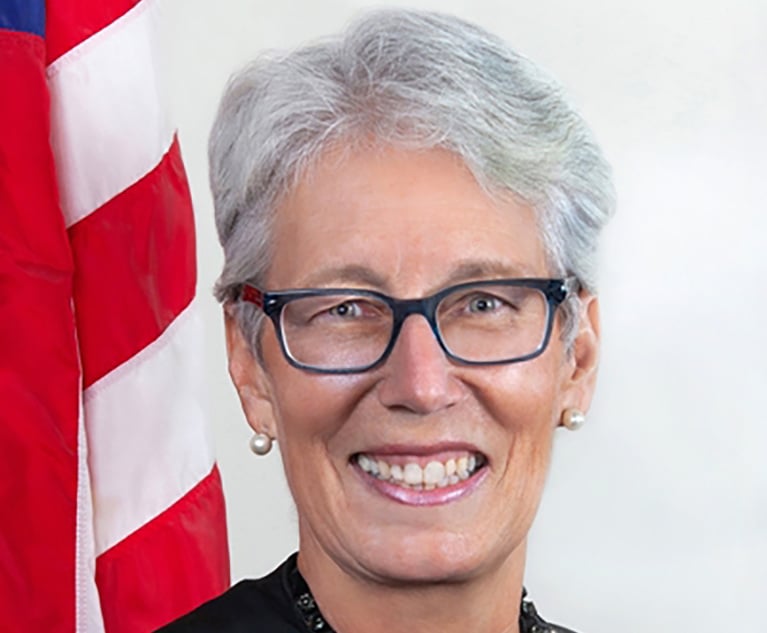 Photo: Jason R. Bennitt/GC South
Photo: Jason R. Bennitt/GC South Judiciary Rolls Out New Rule to Implement Bail Reform
The rule follows through on a legislative mandate to use an empirical risk-assessment tool to gauge the risk defendants pose to public safety and their likelihood to appear for court dates.
December 17, 2018 at 03:04 PM
4 minute read
The original version of this story was published on Delaware Law Weekly
The Delaware judiciary unveiled a new rule Monday aimed at implementing legislation that authorizes the courts to reduce their reliance on pretrial cash bail.
The rule, which is slated to take effect Jan. 1, follows through on a legislative mandate to use an empirical risk-assessment tool to gauge the risk defendants pose to public safety and their likelihood to appear for court dates. In most cases, cash bail will not be required as a condition of pretrial release, and judges will be directed to impose the “least restrictive conditions necessary” to ensure compliance.
“The interim rule is a product of a collaborative effort of all of the courts involved with making bail decisions,” Superior Court President Judge Jan R. Jurden said in a statement. “This is an important reform and we look forward to working with our system partners as we implement this improved approach to pretrial release.”
Monday's announcement was the latest in a series of moves by Delaware policymakers, who are hoping to eliminate cash bail altogether. In June, lawmakers in Dover fell short of passing the first leg of a constitutional amendment, which would have nixed the use of cash bail entirely and allowed those accused of violent crimes to be held, without the possibility of release, before trial.
At the urging of judges, police and correction officers, the General Assembly did approve HB 204 in January, laying the groundwork for the larger overhaul. Under that law, the courts had until the start of the new year to develop a risk-based analysis system that encourages judges to first consider other conditions for pretrial release, such as monitoring and travel restrictions.
The result was the Delaware Pretrial Assessment Tool, or DELPAT, which takes into account the risk of defendants failing to show for court, the threat they pose to the community and the threat to which they might obstruct justice in their cases.
Given the tight timetable, the judiciary said the rule governing DELPAT would be implemented on an interim basis, allowing for feedback and possible adjustments moving forward.
“The rule represents a good faith effort to implement the act in an efficient and equitable manner by the deadline the act imposes,” Delaware Supreme Court Chief Justice Leo E. Strine Jr. said. “The judiciary and its constituents must now pull together to make the act and the rule work as well as possible, and to improve it further based on the experience we gain during the next year.”
The courts said that they would institute an “enhanced system of notifications” to make sure that defendants are frequently reminded of court dates. Under the new rule, more stringent conditions of release could only be implemented upon a special finding by the court; however, if a defendant does fail to appear, judges would have discretion to impose cash bail as a consequence for the violation.
It also identifies serious “signal crimes,” such as violent, sex or drug offenses, for which judges would not need to defer to DELPAT analyses and instead impose other conditions necessary to maintain public safety.
“The risk assessment instrument and the new court rule provide us with an evidence based method to make sound bail decisions in a systematic way,” said Chief Judge Alex J. Smalls of the Court of Common Pleas.
The status of broader bail reform efforts, meanwhile, remains in limbo. Proponents have vowed to reintroduce legislation next year to amend the state constitution and eradicate cash bail. In Delaware, constitutional amendments must pass two consecutive sessions of the General Assembly by a two-thirds majority, meaning that the changes could not go into effect until 2021, at the earliest.
This content has been archived. It is available through our partners, LexisNexis® and Bloomberg Law.
To view this content, please continue to their sites.
Not a Lexis Subscriber?
Subscribe Now
Not a Bloomberg Law Subscriber?
Subscribe Now
NOT FOR REPRINT
© 2024 ALM Global, LLC, All Rights Reserved. Request academic re-use from www.copyright.com. All other uses, submit a request to [email protected]. For more information visit Asset & Logo Licensing.
You Might Like
View All
Attorneys, Professors Share Support for Chancellor Following Musk's Online Attacks
4 minute read

Jurden Announces 2025 Retirement, Capping 24 Years on Superior Court
3 minute read
Trending Stories
- 1The Key Moves in the Reshuffling German Legal Market as 2025 Dawns
- 2Social Media Celebrities Clash in $100M Lawsuit
- 3Federal Judge Sets 2026 Admiralty Bench Trial in Baltimore Bridge Collapse Litigation
- 4Trump Media Accuses Purchaser Rep of Extortion, Harassment After Merger
- 5Judge Slashes $2M in Punitive Damages in Sober-Living Harassment Case
Who Got The Work
Michael G. Bongiorno, Andrew Scott Dulberg and Elizabeth E. Driscoll from Wilmer Cutler Pickering Hale and Dorr have stepped in to represent Symbotic Inc., an A.I.-enabled technology platform that focuses on increasing supply chain efficiency, and other defendants in a pending shareholder derivative lawsuit. The case, filed Oct. 2 in Massachusetts District Court by the Brown Law Firm on behalf of Stephen Austen, accuses certain officers and directors of misleading investors in regard to Symbotic's potential for margin growth by failing to disclose that the company was not equipped to timely deploy its systems or manage expenses through project delays. The case, assigned to U.S. District Judge Nathaniel M. Gorton, is 1:24-cv-12522, Austen v. Cohen et al.
Who Got The Work
Edmund Polubinski and Marie Killmond of Davis Polk & Wardwell have entered appearances for data platform software development company MongoDB and other defendants in a pending shareholder derivative lawsuit. The action, filed Oct. 7 in New York Southern District Court by the Brown Law Firm, accuses the company's directors and/or officers of falsely expressing confidence in the company’s restructuring of its sales incentive plan and downplaying the severity of decreases in its upfront commitments. The case is 1:24-cv-07594, Roy v. Ittycheria et al.
Who Got The Work
Amy O. Bruchs and Kurt F. Ellison of Michael Best & Friedrich have entered appearances for Epic Systems Corp. in a pending employment discrimination lawsuit. The suit was filed Sept. 7 in Wisconsin Western District Court by Levine Eisberner LLC and Siri & Glimstad on behalf of a project manager who claims that he was wrongfully terminated after applying for a religious exemption to the defendant's COVID-19 vaccine mandate. The case, assigned to U.S. Magistrate Judge Anita Marie Boor, is 3:24-cv-00630, Secker, Nathan v. Epic Systems Corporation.
Who Got The Work
David X. Sullivan, Thomas J. Finn and Gregory A. Hall from McCarter & English have entered appearances for Sunrun Installation Services in a pending civil rights lawsuit. The complaint was filed Sept. 4 in Connecticut District Court by attorney Robert M. Berke on behalf of former employee George Edward Steins, who was arrested and charged with employing an unregistered home improvement salesperson. The complaint alleges that had Sunrun informed the Connecticut Department of Consumer Protection that the plaintiff's employment had ended in 2017 and that he no longer held Sunrun's home improvement contractor license, he would not have been hit with charges, which were dismissed in May 2024. The case, assigned to U.S. District Judge Jeffrey A. Meyer, is 3:24-cv-01423, Steins v. Sunrun, Inc. et al.
Who Got The Work
Greenberg Traurig shareholder Joshua L. Raskin has entered an appearance for boohoo.com UK Ltd. in a pending patent infringement lawsuit. The suit, filed Sept. 3 in Texas Eastern District Court by Rozier Hardt McDonough on behalf of Alto Dynamics, asserts five patents related to an online shopping platform. The case, assigned to U.S. District Judge Rodney Gilstrap, is 2:24-cv-00719, Alto Dynamics, LLC v. boohoo.com UK Limited.
Featured Firms
Law Offices of Gary Martin Hays & Associates, P.C.
(470) 294-1674
Law Offices of Mark E. Salomone
(857) 444-6468
Smith & Hassler
(713) 739-1250






